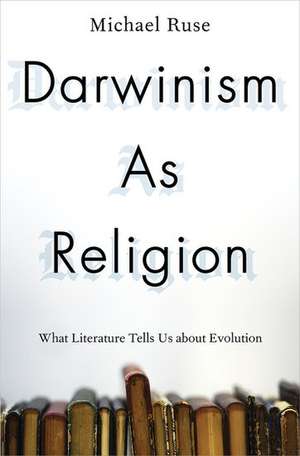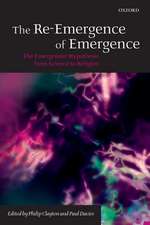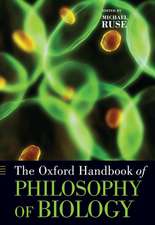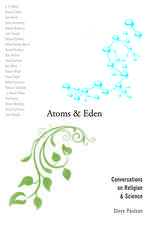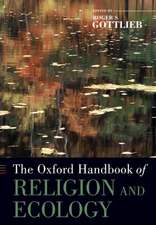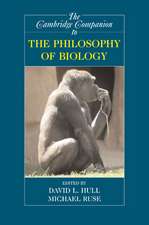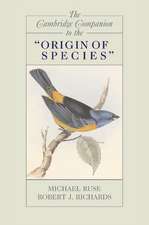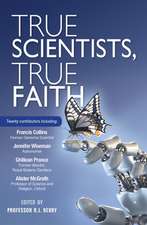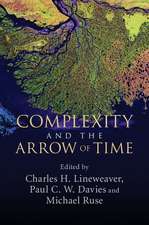Darwinism as Religion: What Literature Tells Us about Evolution
Autor Michael Ruseen Limba Engleză Hardback – 3 noi 2016
Preț: 317.45 lei
Preț vechi: 356.90 lei
-11% Nou
Puncte Express: 476
Preț estimativ în valută:
60.74€ • 63.30$ • 50.30£
60.74€ • 63.30$ • 50.30£
Carte tipărită la comandă
Livrare economică 24-29 martie
Preluare comenzi: 021 569.72.76
Specificații
ISBN-13: 9780190241025
ISBN-10: 0190241020
Pagini: 328
Dimensiuni: 239 x 163 x 33 mm
Greutate: 0.79 kg
Editura: Oxford University Press
Colecția OUP USA
Locul publicării:New York, United States
ISBN-10: 0190241020
Pagini: 328
Dimensiuni: 239 x 163 x 33 mm
Greutate: 0.79 kg
Editura: Oxford University Press
Colecția OUP USA
Locul publicării:New York, United States
Recenzii
[T]he point of Ruse's book is not to analyze the details of the arguments for and against Darwinism as a religion. Rather, Ruse seeks simply to demonstrate the existence of such a religious perspective, and to show that its influence can be fruitfully studied by analyzing literature. In this task Ruse succeeds, and his book will surely inspire further research into the topic.
Very few workers in the Darwin industry have been as industrious as Michael Ruse. Author or editor of some 50 books in as many years, he has introduced countless students and colleagues to the history and philosophy of science, to evolutionary biology and its history and to almost every aspect of Darwins science and its development...In her endorsement, Dame Gillian Beer refers to Darwinism as Religion as a book that 'comes bubbling up out of a deep well of enjoyment'. It may not be a book for the science classroom, but the enjoyment is highly infectious.
Ruse's book is an absolute joy to read and to ponder. It is a witty and, at times, polemical work that pursues a provocative and thought-provoking thesis that is by definition almost impossible to prove. To put it another way, it is a book that could have been written only by Michael Ruse. And that is indeed a good thing.
This is certainly not conventionally an academic book: it's copious, opinionated, sweeping. It is also wonderfully impassioned. The book comes bubbling up out of a deep well of enjoyment. Professor Ruse has read an immense array of Victorian and later anglophone literature and shares his surprise and pleasure in it. He has read it all with eyes that have also focused intensely on Charles Darwin's ideas and their influence. His pursuit in this study is inclusiveness: he is absorbed in close-grained appreciation of particular cases and curious instances... the pleasure of the work is its intensely personal reading of deep questions that have preoccupied writers, and people at large, over the last hundred and fifty years.
Michael Ruse traces various notions of progress and of natural religion that came to offer a comfortable nest for the fledgling evolutionary theory in the mid-Nineteenth Century, and he follows its flight into celestial realms, showing how Darwinism became transformed into a kind of religion. He detects the path of this new theology especially as it was manifested in the novels and poetry of the period. Ruse reveals a dimension to the works of Eliot, London, Dreiser, Hardy, Sinclair, and Steinbeck that lay in the shadows. Even social patterns displayed by Henry James's characters are refracted differently through Ruse's scholarship. Ruse's touch is light and his insights multiple.
Very few workers in the Darwin industry have been as industrious as Michael Ruse. Author or editor of some 50 books in as many years, he has introduced countless students and colleagues to the history and philosophy of science, to evolutionary biology and its history and to almost every aspect of Darwins science and its development...In her endorsement, Dame Gillian Beer refers to Darwinism as Religion as a book that 'comes bubbling up out of a deep well of enjoyment'. It may not be a book for the science classroom, but the enjoyment is highly infectious.
Ruse's book is an absolute joy to read and to ponder. It is a witty and, at times, polemical work that pursues a provocative and thought-provoking thesis that is by definition almost impossible to prove. To put it another way, it is a book that could have been written only by Michael Ruse. And that is indeed a good thing.
This is certainly not conventionally an academic book: it's copious, opinionated, sweeping. It is also wonderfully impassioned. The book comes bubbling up out of a deep well of enjoyment. Professor Ruse has read an immense array of Victorian and later anglophone literature and shares his surprise and pleasure in it. He has read it all with eyes that have also focused intensely on Charles Darwin's ideas and their influence. His pursuit in this study is inclusiveness: he is absorbed in close-grained appreciation of particular cases and curious instances... the pleasure of the work is its intensely personal reading of deep questions that have preoccupied writers, and people at large, over the last hundred and fifty years.
Michael Ruse traces various notions of progress and of natural religion that came to offer a comfortable nest for the fledgling evolutionary theory in the mid-Nineteenth Century, and he follows its flight into celestial realms, showing how Darwinism became transformed into a kind of religion. He detects the path of this new theology especially as it was manifested in the novels and poetry of the period. Ruse reveals a dimension to the works of Eliot, London, Dreiser, Hardy, Sinclair, and Steinbeck that lay in the shadows. Even social patterns displayed by Henry James's characters are refracted differently through Ruse's scholarship. Ruse's touch is light and his insights multiple.
Notă biografică
Michael Ruse was born in England in 1940. In 1962 he moved to Canada and taught philosophy for thirty-five years at the University of Guelph in Ontario, before taking his present position at Florida State University in 2000. He is a philosopher and historian of science, with a particular interest in Darwin and evolutionary biology. The author or editor of over fifty books and the founding editor of the journal Biology and Philosophy, he is a fellow of the Royal Society of Canada, a former Guggenheim Fellow and Gifford Lecturer, and the recipient of four honorary degrees.
